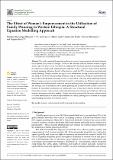| dc.contributor.author | Muluneh, Muluken Dessalegn | |
| dc.contributor.author | Francis, Lyn | |
| dc.contributor.author | Ayele, Mhiret | |
| dc.contributor.author | Abebe, Sintayehu | |
| dc.contributor.author | Makonnen, Misrak | |
| dc.contributor.author | Stulz, Virginia | |
| dc.date.accessioned | 2021-09-10T19:57:43Z | |
| dc.date.available | 2021-09-10T19:57:43Z | |
| dc.date.issued | 6/9/2021 | |
| dc.identifier.citation | Muluneh, M.D.; Francis, L.; Ayele, M.; Abebe, S.; Makonnen, M.; Stulz, V. The Effect of Women’s Empowerment in the Utilisation of Family Planning in Western Ethiopia: A Structural Equation Modelling Approach. Int. J. Environ. Res. Public Health 2021, 18, 6550. https:// doi.org/10.3390/ijerph18126550 | en_US |
| dc.identifier.other | PMID: 34207017 | |
| dc.identifier.other | PMCID: PMC8296516 19(12) 6550 | |
| dc.identifier.uri | http://repository.amref.org/handle/123456789/236 | |
| dc.description | : © 2021 by the authors.
Licensee MDPI, Basel, Switzerland.
This article is an open access article
distributed under the terms and
conditions of the Creative Commons
Attribution (CC BY) license (https://
creativecommons.org/licenses/by/
4.0/). | en_US |
| dc.description.abstract | This study examines the associations between women’s empowerment and family planning use in Jimma Zone, Western Ethiopia. A total of 746 randomly selected married women of reproductive age were interviewed. The data were employed by structural equation modelling (SEM) to investigate the complex and multidimensional pathways to show women’s empowerment domains in family planning utilisation. Results of the study revealed that 72% of married women had used family planning. Younger women, having access to information, having access to health facilities and being aware about family planning methods, living in a rural area, having an older partner and increased household decision-making power were associated with using family planning methods. Women’s empowerment is an important determinant of contraceptive use. Women’s empowerment dimensions included increased household decision-making power, socio-demographic variables and having access to information about family planning and accessible health facilities. These were found to be important determinants of contraceptive use. Future interventions should focus on integrating women’s empowerment into family planning programming, particularly in enhancing women’s autonomy in decision making. Further research is warranted on the socio-cultural context of women that influences women’s empowerment and family planning use to establish an in-depth understanding and equity of women in society. | en_US |
| dc.description.sponsorship | Amref Health Africa. This research is part of a Packard project funded by the Packard Foundation. | en_US |
| dc.language.iso | en | en_US |
| dc.publisher | MDPI | en_US |
| dc.subject | Women’s empowerment | en_US |
| dc.subject | Family planning | en_US |
| dc.subject | Decision making | en_US |
| dc.title | The Effect of Women’s Empowerment in the Utilisation of Family Planning in Western Ethiopia: A Structural Equation Modelling Approach | en_US |
| dc.type | Article, Journal | en_US |

